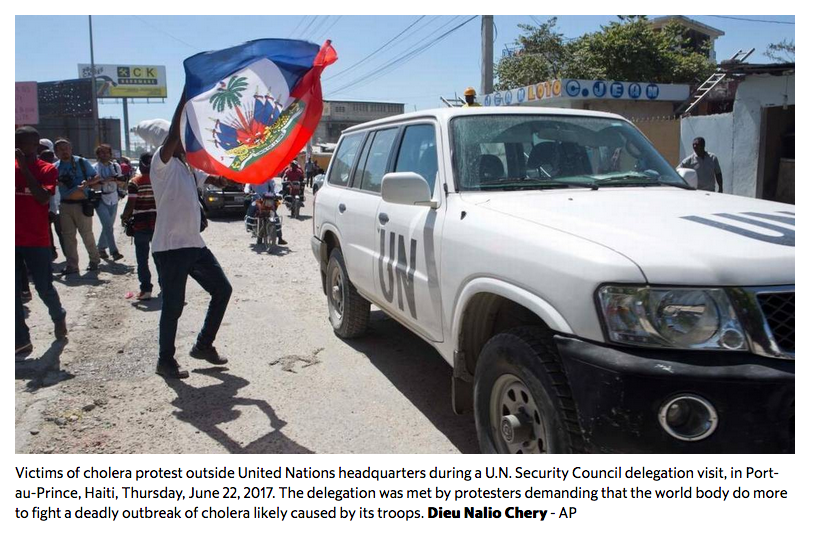Earlier this fall, as the United Nations’ blue-helmet peacekeepers began their withdrawal from Haiti, many of their countries rushed to the beleaguered nation’s aid, turning over millions of dollars in unspent peacekeeping dollars to help eliminate a deadly cholera epidemic.
Some countries, faced with roadblocks in their parliaments, reprogrammed dollars. Others, like Norway, added an additional $465,000 to its $335,000 refund.
But the United States, which had already stated its opposition to U.N. Secretary General António Guterres’ request over reassigning $11 million in unspent Haiti peacekeeping money, is refusing even though the Senate Appropriations Committee gave it the green light in September. The Senate provision allows the Trump administration to use the unspent peacekeeping dollars for Haiti’s cholera plan.
“If the administration is concerned about this tragedy as they profess to be, they need to contribute,” said Tim Rieser, foreign policy aide to Sen. Patrick Leahy, the Vermont Democrat and committee vice chairman who pushed the provision allowing the administration to turn over the funds.
“The administration refuses to use the authority Sen. Leahy provided, but neither have they proposed to use other funds for this purpose,” Rieser said.
Of an unspent $40.5 million that Guterres was hoping to get reassigned, only $3.2 million from 30 nations has trickled in so far, frustrating U.N. officials. Among them is U.N. Deputy Secretary-General Amina Mohammed, who is leading a high-level visit to Haiti Friday through Sunday to show U.N. commitment to the country and its faltering democracy.
“There are many, many crises in the world but you would think…you would get a better response than we have had from the international community,” Mohammed said. “This is not a large amount of money. And whatever we get makes a big difference, and we will plow it into what we’re doing.”
Mohammed will travel to Port-au-Prince, Haiti’s capital, with Josette Sheeran, the former head of the World Food Program whom Guterres appointed in June to serve as his special envoy to Haiti. Sheeran’s main task is to develop a comprehensive fund-raising strategy to finance the U.N.’s cash-strapped $400-million cholera plan.
While Mohammed and Sheeran plan to emphasize the U.N.’s commitment to ending cholera, the waterborne-disease isn’t the main focus of their visit.
“We will look at the cholera challenge we have there,” Mohammed said. “There has been much progress but it’s not down to zero and that’s what we would like. But we want to go further than that. This trip is really about much more than just getting behind the cholera. It’s about development.
“The thrust for us is to make sure that Haiti is front and center in all our efforts to support countries to achieve the goals,” she said, referring to the sustainable development goals that call for eradicating poverty and addressing issues such as climate change by 2030.
Key to Haiti’s development, say U.N. diplomats, is the recently created United Nations Mission for Justice Support in Haiti (MINUJUSTH), which replaced the peacekeeping mission on Oct. 16. The smaller mission, which is focused on justice, police development and human rights, has been the target of criticism by some Haitian lawmakers, who have scheduled a Nov. 14 parliament session to debate the mission’s agreement.
Guterres has announced the appointment of Susan Page as his special representative and head of MINUJUSTH. A U.S. diplomat, Page previously served as deputy special representative for rule of law in the Haiti peacekeeping mission.
Mohammed said MINUJUSTH is incredibly important to what the U.N. under Guterres’ leadership is trying to achieve in Haiti with not just cholera, poverty levels and development but sexual exploitation and abuse. The country needs to strengthen institutions, she said, so that it can deliver services to its citizens.
“Hopefully the training that will accompany what we do there and bringing back civil institutions will be helpful,” Mohammed said. “I think we all just have to make sure we’re all joined up on the front of rule and law, and governance and addressing some of the issues.
“I’m very mindful that we have fallen short in Haiti,” she added. “And what we need is another chance to prove that our intentions will get results and I hope that we can have a meaningful dialogue to take that forward.”
As part of that, Mohammed and Sheeran will visit Haiti’s southern region, which was ravaged last year by Hurricane Matthew. While there, they will meet with Haitian President Jovenel Moïse, who during his first address to the U.N. General Assembly last month, called on the U.N. to compensate cholera victims and their families, and announced the return of the Haitian Army, 23 years after it was forced to disband under U.S. pressure.
Privately, Moïse also insisted that the U.N. stop considering Haiti a threat to the region’s security and remove it from a “Chapter 7” designation, which allows the U.N. Security Council to deploy forces to restore peace.
The team also will visit Mirebalais, the central Haiti community where cholera began, and where the U.N. has chosen to build a pilot community project representing “a concrete and tangible expression of the UN’s regret for the suffering that the Haitian people have endured as a result of cholera.”
“It’s been 11 months since the U.N. promised to consult with victims and to our knowledge they have yet to begin,” said Beatrice Lindstrom, an attorney who represented cholera victims in an unsuccessful U.S. lawsuit. “We hope that the upcoming trip begins to change that.”
Lindstrom said despite assertions by Guterres that victims’ compensation consultations are taking place, to the best of advocates’ knowledge, no such consultations have taken place. The only consultations have been in relation to the Mirebalais pilot, which “by design doesn’t give an opportunity for victims to speak about what the they would like to see from the U.N. more broadly,” Lindstrom said.
